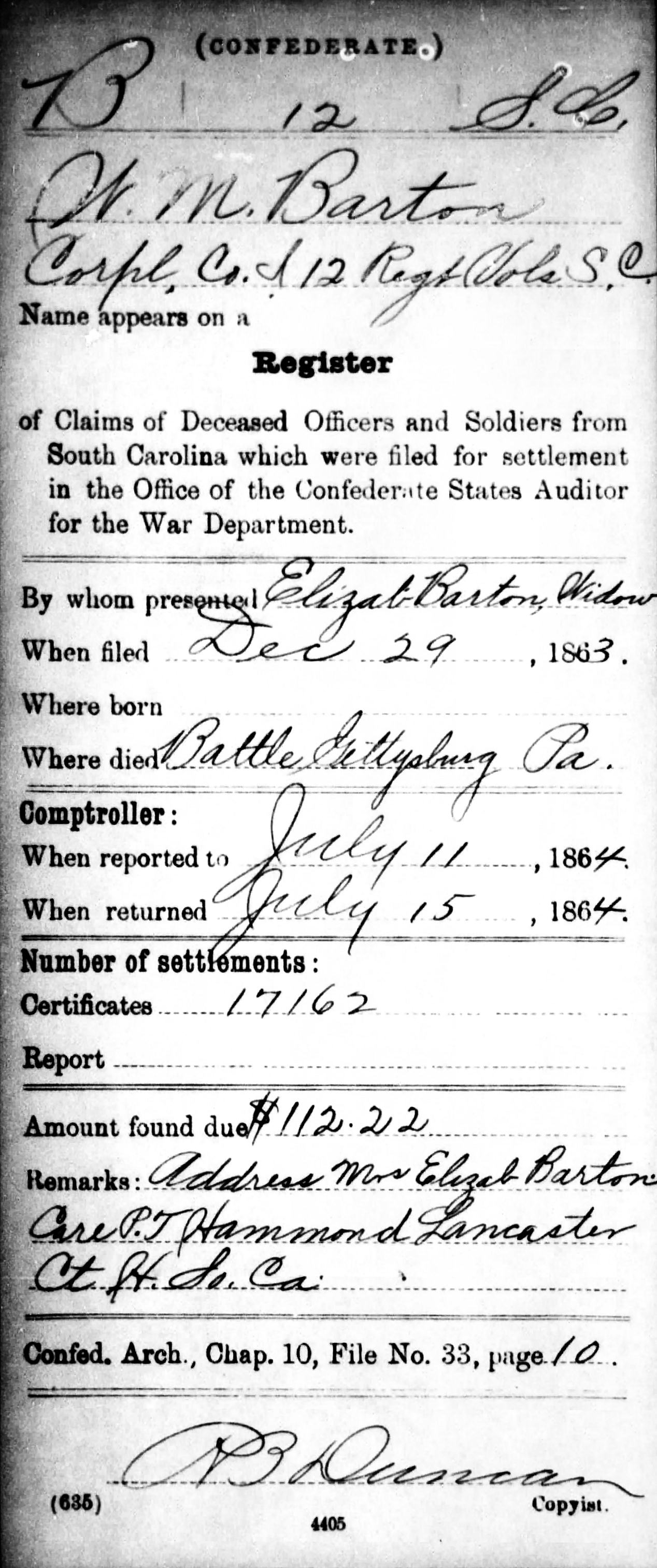Husband of Elizabeth Malinda Caskey Barton (b. March 1835?)
Father of two children. (James L. Barton b. 1859 and Sarah Barton _____ b. ~1861)
Melinda is listed as having 2/2 children alive in 1900 and 2/2 children alive in 1910.
------------------------------------
William Morrow Barton enlisted August 2, 1861 in Lancasterville (now Lancaster, SC) under Captain Dixon Barnes. He was 25 years old. He reported for duty on August 28, 1861 and was in Lightwood Knot Springs near Columbia, South Carolina August 30, 1861. He was in Company I, 12th Reg. South Carolina Volunteers (Infantry). This company is also referred to as Dunovant's Regiment of S.C. Volunteers. He started out as a Private.
From a report regarding casualties of the regiment at a battle near Port Royal Ferry, South Carolina on January 1, 1862 they are said to be near Pocotogigo, SC on Jan. 5, 1862 - W.M. Barton "wounded with musket ball in the left pectoral muscles - seriously."
He was wounded at Sharpsburg, Maryland on September 17, 1862 (Battle of Antietam). He was hospitalized in Richmond, Virginia. William was approved for a 30 day furlough by Surgeon A.G. Lane.
By the time of his death, he had been promoted to corporal under Captain W.J. Stovers. He was killed in Gettysburg, Pennsylvania July 1, 1863. He was described as being 6 feet, 1 inch tall with fair complexion, light hair and having grey eyes.
(Compiled from his Confederate Service Records)
------------------------------------
The 12th South Carolina Infantry Regiment completed its organization in July, 1861, at Lightwoodknot Springs, near Columbia, South Carolina. The men were raised in the counties of Oconee, York, Lancaster, Kershaw, and Fairfield. It served on the South Carolina coast near Pocotaligo, then in April, 1862, moved to Virginia. Assigned to General Gregg's and McGowan's Brigade, the regiment fought with the Army of Northern Virginia from the Seven Days' Battles to Fredericksburg.
During the Chancellorsville operations the 12th was detached to guard ordinance trains and prisoners. With 340 men it marched 2,000 Federals to Richmond. Later the unit rejoined the brigade and continued the conflict from Gettysburg to Cold Harbor, then saw action in the Petersburg trenches and the Appomattox Campaign. It lost 17 killed and 121 wounded at Gaines' Mill, fifty-four percent of 270 at Second Manassas, 20 killed and 82 wounded at Sharpsburg, and thirty-six percent of the 366 at Gettysburg.
The regiment sustained 102 casualties at The Wilderness, 118 at Spotsylvania, 34 from May 12 to July 1, 1864, 18 at Deep Bottom, 26 at Fussell's Mill, and 23 at Poplar Springs Church. It surrendered 10 officers and 149 men. The field officers were Colonels Dixon Barnes, Edwin F. Bookter, Richard G.M. Dunovant, Cadwalader Jones, and John L. Miller; and Lieutenant Colonels T. Frank Clyburn, Henry C. Davis, and William H. McCorkle.
------------------------------------
John Lytle Barton, (also of the 12th Regiment) named a son born in 1871 "William Morrow Barton" - possibly a namesake?
------------------------------------
Husband of Elizabeth Malinda Caskey Barton (b. March 1835?)
Father of two children. (James L. Barton b. 1859 and Sarah Barton _____ b. ~1861)
Melinda is listed as having 2/2 children alive in 1900 and 2/2 children alive in 1910.
------------------------------------
William Morrow Barton enlisted August 2, 1861 in Lancasterville (now Lancaster, SC) under Captain Dixon Barnes. He was 25 years old. He reported for duty on August 28, 1861 and was in Lightwood Knot Springs near Columbia, South Carolina August 30, 1861. He was in Company I, 12th Reg. South Carolina Volunteers (Infantry). This company is also referred to as Dunovant's Regiment of S.C. Volunteers. He started out as a Private.
From a report regarding casualties of the regiment at a battle near Port Royal Ferry, South Carolina on January 1, 1862 they are said to be near Pocotogigo, SC on Jan. 5, 1862 - W.M. Barton "wounded with musket ball in the left pectoral muscles - seriously."
He was wounded at Sharpsburg, Maryland on September 17, 1862 (Battle of Antietam). He was hospitalized in Richmond, Virginia. William was approved for a 30 day furlough by Surgeon A.G. Lane.
By the time of his death, he had been promoted to corporal under Captain W.J. Stovers. He was killed in Gettysburg, Pennsylvania July 1, 1863. He was described as being 6 feet, 1 inch tall with fair complexion, light hair and having grey eyes.
(Compiled from his Confederate Service Records)
------------------------------------
The 12th South Carolina Infantry Regiment completed its organization in July, 1861, at Lightwoodknot Springs, near Columbia, South Carolina. The men were raised in the counties of Oconee, York, Lancaster, Kershaw, and Fairfield. It served on the South Carolina coast near Pocotaligo, then in April, 1862, moved to Virginia. Assigned to General Gregg's and McGowan's Brigade, the regiment fought with the Army of Northern Virginia from the Seven Days' Battles to Fredericksburg.
During the Chancellorsville operations the 12th was detached to guard ordinance trains and prisoners. With 340 men it marched 2,000 Federals to Richmond. Later the unit rejoined the brigade and continued the conflict from Gettysburg to Cold Harbor, then saw action in the Petersburg trenches and the Appomattox Campaign. It lost 17 killed and 121 wounded at Gaines' Mill, fifty-four percent of 270 at Second Manassas, 20 killed and 82 wounded at Sharpsburg, and thirty-six percent of the 366 at Gettysburg.
The regiment sustained 102 casualties at The Wilderness, 118 at Spotsylvania, 34 from May 12 to July 1, 1864, 18 at Deep Bottom, 26 at Fussell's Mill, and 23 at Poplar Springs Church. It surrendered 10 officers and 149 men. The field officers were Colonels Dixon Barnes, Edwin F. Bookter, Richard G.M. Dunovant, Cadwalader Jones, and John L. Miller; and Lieutenant Colonels T. Frank Clyburn, Henry C. Davis, and William H. McCorkle.
------------------------------------
John Lytle Barton, (also of the 12th Regiment) named a son born in 1871 "William Morrow Barton" - possibly a namesake?
------------------------------------
Family Members
Advertisement
Records on Ancestry
Sponsored by Ancestry
Advertisement










